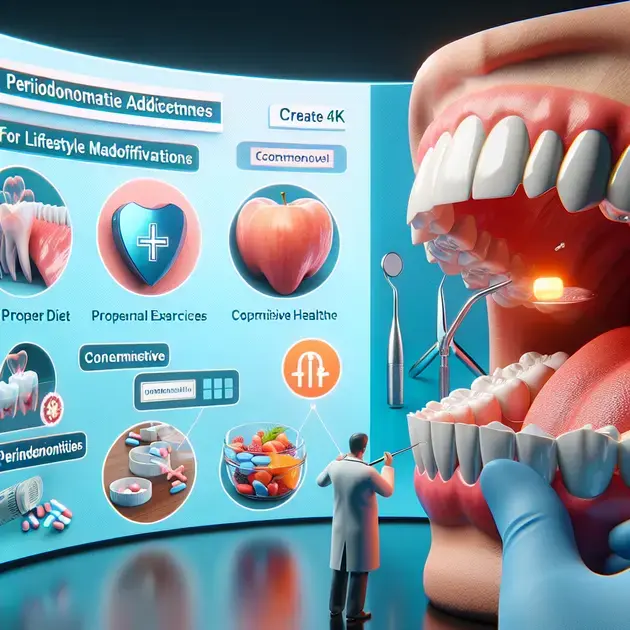Looking for effective medication for periodontitis? You’ve come to the right place. In this comprehensive guide, we will explore the latest treatments and therapies available to combat this common and often serious gum disease.
Periodontitis affects millions of people worldwide and can lead to tooth loss if left untreated. Fortunately, advancements in dental care have produced a range of effective medications to help manage and even reverse the effects of this condition. Let’s delve into the details to find the best solution for you.

Overview of Periodontitis Medication
Periodontitis medication is an essential part of treating gum disease and preventing further complications. One common type of medication used is antibiotics, which help to eliminate bacteria causing the infection. These antibiotics can be prescribed in pill form or as a mouth rinse, depending on the severity of the infection.
Another type of medication commonly used for periodontitis is antimicrobial mouthwash. This mouthwash helps to reduce the amount of bacteria in the mouth, promoting healing of the gums. It is typically used in conjunction with other dental treatments such as scaling and root planing.
For severe cases of periodontitis, your dentist may recommend a local antibiotic application. This involves placing antibiotics directly into the pockets of the gums where bacteria are present, helping to target the infection more effectively.
It is important to follow your dentist’s instructions carefully when using periodontitis medication to ensure the best results. Make sure to complete the full course of antibiotics, even if your symptoms improve before the medication is finished.
Overall, periodontitis medication plays a crucial role in managing gum disease and preventing it from progressing to more severe stages. Combined with good oral hygiene practices, medication can help restore gum health and prevent future issues.
The Importance of Early Treatment
Early treatment of periodontitis is crucial for preventing irreversible damage to the gums and supporting structures of the teeth. When gum disease is caught in its early stages, it is easier to treat and manage effectively.
One important aspect of early treatment is regular dental check-ups and cleanings. Your dentist can detect signs of gum disease early on and recommend appropriate treatment to prevent it from worsening.
Practicing good oral hygiene at home is also essential for early treatment. This includes brushing your teeth twice a day, flossing daily, and using an antimicrobial mouthwash to reduce bacteria in the mouth.
If you notice symptoms of gum disease such as bleeding gums, swollen gums, or persistent bad breath, it is important to seek treatment from your dentist right away. Ignoring these symptoms can lead to the progression of periodontitis and potentially tooth loss.
By addressing gum disease early with the help of your dentist and practicing good oral hygiene habits, you can prevent further complications and maintain healthy gums and teeth for the long term.
Comparing Different Treatment Options
When it comes to treating periodontitis, there are several different options available depending on the severity of the gum disease. One common treatment option is scaling and root planing, which involves deep cleaning of the teeth and roots to remove plaque and tartar buildup.
For more advanced cases of periodontitis, surgical intervention may be necessary. Procedures such as flap surgery or bone and tissue grafts can help restore the health of the gums and supporting structures of the teeth.
In addition to traditional treatments, advancements in technology have led to innovative treatment options such as laser therapy for periodontitis. This minimally invasive procedure uses laser energy to target and remove infected tissue, promoting faster healing and less discomfort for the patient.
Some patients may benefit from adjunctive therapies such as probiotics or enzyme suppressants to help maintain a healthy balance of bacteria in the mouth and prevent reinfection. These treatments can be used in conjunction with standard periodontal treatments for optimal results.
It is important to consult with your dentist or periodontist to determine the most suitable treatment option for your specific needs and to create a personalized treatment plan that addresses your individual gum health goals.

**The Role of Medication in Periodontitis Treatment**
Understanding the Importance of Medication
Medication plays a crucial role in the treatment of periodontitis, a serious gum infection that can lead to tooth loss if left untreated. The primary purpose of medication in periodontitis treatment is to control the bacterial infection in the gums, reduce inflammation, and promote healing. Antibiotics are often prescribed to target the specific bacteria causing the infection and to prevent further spread of the disease.
Furthermore, medication can help alleviate pain and discomfort associated with periodontitis, allowing patients to manage their symptoms more effectively. By following the prescribed medication regimen, patients can help prevent complications and improve their oral health outcomes.
It is important for patients to adhere to their medication schedule as directed by their healthcare provider to ensure optimal results. Missing doses or discontinuing medication prematurely can compromise the effectiveness of the treatment and may lead to the recurrence of infection.
In addition to antibiotics, other medications such as antimicrobial mouthwashes and pain relievers may also be recommended as part of a comprehensive treatment plan for periodontitis. These medications work synergistically to combat the infection and manage symptoms, promoting faster recovery and better overall oral health.
Overall, medication is a critical component of periodontitis treatment and plays a key role in controlling the infection, reducing inflammation, and promoting healing in the gums. By following medication instructions carefully and consistently, patients can achieve optimal results and improve their oral health outcomes.
Enhancing Treatment Efficacy through Adherence
Adherence to medication instructions is essential for achieving optimal results in the treatment of periodontitis. Patients must follow their healthcare provider’s recommendations regarding dosage, frequency, and duration of medication to ensure the effectiveness of the treatment. Failure to adhere to medication instructions can hinder recovery and may result in the persistence or worsening of gum infection.
To enhance adherence, patients should ask their healthcare provider any questions they may have about their medication regimen and clarify any doubts or concerns. It is important to understand the purpose of each medication, how to take it correctly, and any potential side effects to watch for.
Keeping a medication log or setting reminders can help patients stay on track with their treatment plan. Establishing a routine for taking medication can also improve adherence and ensure consistency in dosing. Communicating openly with healthcare providers about any challenges or barriers to adherence can help address issues proactively and support successful treatment outcomes.
Patients should never alter their medication regimen without consulting their healthcare provider, as changes in dosage or discontinuation of medication can compromise the efficacy of the treatment. By adhering to medication instructions and actively engaging in their treatment plan, patients can optimize the outcomes of periodontitis therapy and promote better oral health.
Overall, adherence to medication instructions is a critical factor in achieving optimal results in periodontitis treatment. By following their healthcare provider’s guidance, patients can effectively combat gum infection, reduce inflammation, and support healing for improved oral health outcomes.
Integrating Lifestyle Modifications for Comprehensive Care
In addition to medication therapy, lifestyle modifications play a significant role in the holistic management of periodontitis. By incorporating healthy habits and behaviors into their daily routine, patients can enhance the effectiveness of medication therapy and promote long-term oral health.
Dietary changes, such as reducing sugar intake and increasing consumption of nutrient-rich foods, can support gum health and overall wellness. Maintaining good oral hygiene practices, including regular brushing, flossing, and dental check-ups, is essential for preventing gum disease and supporting the effects of medication therapy.
Quitting smoking and avoiding other tobacco products is crucial for managing periodontitis, as smoking can exacerbate gum inflammation and hinder the healing process. Engaging in regular physical activity and managing stress can also have positive effects on oral health and contribute to the success of medication therapy.
Furthermore, incorporating relaxation techniques, such as meditation or yoga, can help reduce inflammation and promote healing in the gums. Seeking support from healthcare providers, dental professionals, and support groups can also aid in the successful integration of lifestyle modifications with medication therapy for comprehensive care.
By taking a proactive approach to wellness and incorporating healthy lifestyle choices, patients can optimize the benefits of medication therapy and improve their overall oral health outcomes. Integrating lifestyle modifications with medication therapy can create a synergistic effect that enhances the effectiveness of treatment and supports long-term gum health.
Conclusion
In conclusion, medication plays a pivotal role in the comprehensive treatment of periodontitis, effectively controlling bacterial infections, reducing inflammation, and promoting healing in the gums. The prescribed antibiotics and other medications not only target specific bacteria causing the infection but also alleviate pain and discomfort, leading to improved oral health outcomes for patients.
Adherence to medication instructions is paramount for the successful management of periodontitis, as deviating from the prescribed regimen can hinder recovery and exacerbate gum infections. By following healthcare providers’ recommendations diligently, patients can combat gum infection, reduce inflammation, and foster healing, contributing to overall improved oral health.
Moreover, integrating lifestyle modifications alongside medication therapy is crucial for long-term gum health. Healthy habits like dietary changes, maintaining oral hygiene practices, quitting smoking, and engaging in physical activity not only enhance the effects of medication but also support the healing process, ultimately bolstering the effectiveness of treatment and ensuring comprehensive care.



